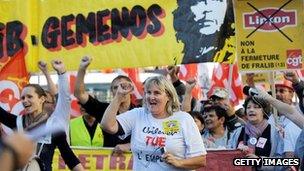Q&A: Austerity measures derailed?
- Published

Opposition to austerity measures is growing across Europe
Opposition to economic austerity measures in the face of the eurozone crisis has resulted in the toppling of Dutch Prime Minister Mark Rutte's minority government and paved the way for early elections.
More broadly, the political turmoil in the Netherlands has raised concerns that the pan-European consensus that government spending must be restrained is unravelling.
Q: Could the Netherlands derail the European pact to implement agreed budget rules for eurozone member states?
A: Not directly.
The treaty to co-ordinate members' budget policies and impose penalties on rule-breakers - the "fiscal compact" - needs to be ratified by just 12 of the 17 eurozone countries to come into force.
Nevertheless, such an early rejection of austerity and budget rules, by a country that has systematically called on other eurozone member states to get their act together, will do little for the treaty's credibility.
Q: So is the Netherlands alone in opposing restrictions on government spending, or are other countries thinking along the same lines?
A: French Socialist presidential candidate Francois Hollande, who is hoping to oust President Nicolas Sarkozy in a second round of the election on 6 May, has promised voters he will seek to renegotiate the treaty if he is elected.
This would at best impose a delay to the ratification of the treaty. At worst, if the French were to turn away from the treaty, it would be rendered toothless and useless, because of France's muscle within the eurozone.
Q: So if voters do not accept austerity measures and tight budget rules, they can simply oust politicians who try to force it upon them?
A: It may not be that easy, given that even opposition politicians in European countries tend to agree that national debts and deficits must be reduced.
Many of them are opposed to sharp and immediate cuts in government spending, however, as they fear this will hamper economic growth and thus make it harder to reduce debts and deficits.
Q: Such political squabbles have been going on for a long time. Could this lack of agreement about how to solve the continuing economic crisis fuel the fire and make the crisis worse?
A: Investors certainly seem to think so. Their fears centre on how this failure to solve problems quickly results in weaker economic growth, which makes the problems even bigger and harder to solve.
Recent economic data offer little hope of an economic recovery in Europe any time soon, with fears growing of deep recessions in Greece, Italy, Spain and Portugal and perhaps even in other European Union member states.
And politically, the growing popularity of eurosceptic, anti-immigration populist parties makes it harder for mainstream parties to stick to pan-European agreements about austerity and budget discipline.